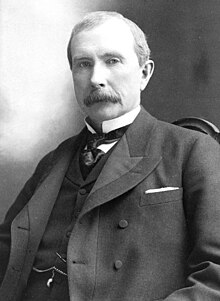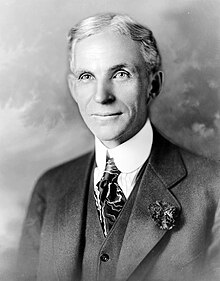U. S. Government/Industrialization/Captains of Industry
Rockefeller
[edit | edit source]
There is gold, and then there is black gold, or oil. In 1859, oil was struck in western Pennsylvania. This even gave an Ohioan, John Davidson Rockefeller, an idea. He decided that oil would become a big business and that his hometown of Cleveland was ideally situated to refine and distribute it to the nation. Rockefeller built a refinery there in 1862. Then, he put together the Standard Oil Trust. A trust is a group of companies that act as one. The Standard Oil came to control all phases of the oil industry, from extraction, to refining, and distribution. Standard Oil was the first of many "trusts" and monopolies formed in industries after the Civil War. Monopolies can be dangerous, because it can keep prices for its goods high without worrying about another business selling the same thing for less.
Carnegie
[edit | edit source]
American businessman, Andrew Carnegie, contributed to making Pittsburgh the nation's steel city. Carnegie saw the Bessemer process in use in England. Realizing that America's need for steel would soon soar, Carnegie built his first steel mill near Pittsburgh in 1873. It became the largest and most modern steel mill of its time. By 1901, 34 separated iron and steel plants lined Pittsburgh's rivers. Carnegie, however, often forced out small steel companies or consolidated (combined) the companies to create a large one. Eventually, Carnegie sold his company to J.P. Morgan for $225 million dollars.
Ford
[edit | edit source]
Henry Ford was born in 1863 on a farm next to a rural town west of Detroit, Michigan. He was the American founder of the Ford Motor Company and father of modern assembly lines used in mass production. His introduction of the Model T automobile revolutionized transportation and American industry. With the use of the assembly line, he produced an affordable car. In addition, unlike other "Captains of Industry", he paid his employees high wages so that they would be able to buy one of his cars. As owner of the Ford Company, he became one of the richest and best known people in the world.
Vanderbilt
[edit | edit source]
Vanderbilt was born to a poor family and quit school at the age of 11, to work for his father who was employed in boating. When he turned 16, he persuaded his mother to give him $100 loan for a boat to start his first business. He repaid the loan after the first year with an additional $1,000. In 1867, Vanderbilt decided that the wave of the future was in building a railroad empire. Vanderbilt bought the Central Railroad and merged it with the Hudson River Railroad. In addition, he spent millions on the improvement of the railroads lines by making them faster and safer. Upon his death, he was the richest man in the United States.
